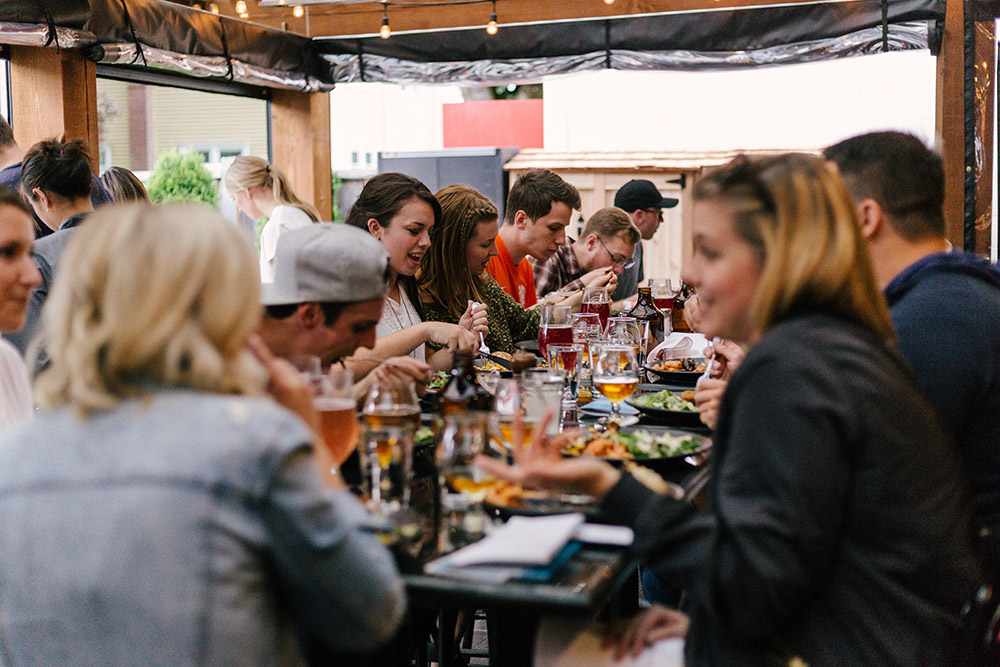
(Unsplash/Priscilla Du Preez)
Some say that if you gather four women in the kitchen, you will hear about five correct ways to set the table and prepare the food. Parents teach us the correct way to do it. That's the most natural thing in the world. Whether we're speaking of family, a culture or a faith tradition, we develop the "expected ways" to do things so that everyone can feel comfortable and know what to expect.
That works just fine for a closed society. But when you gather five cooks or a multicultural group, one custom bumps up against another and causes conflicts that will either separate or transform the community. The one thing certain: They won't remain the same.
That reflects today's story from the Acts of the Apostles. The Jewish members of Christian community in Jerusalem were diverse to the extent that they identified as Hebrews or Hellenists. The Hellenists' ancestors had been in the diaspora and spoke Greek — the original language of the books of the New Testament. The Hebrews were Palestinian Jews who spoke Aramaic.
Language was symbolic of the many cultural differences among them. Tensions came to a head when Hellenist widows felt slighted in the "daily distribution," a phrase that could refer to food given them or to their ministerial assignments.
In order to find a solution, the leaders held what we could call a synod; they gathered the community to decide together how to resolve the problem. This synod could be considered a precursor to the greater synod or council they held to decide what would be required of Gentile converts to the faith (Acts 15).
Today's Gospel and second reading address situations of tension in the midst of diversity, showing how it can lead to something new and deeper than any of the participants would have imagined.
In today's Gospel, Jesus makes the enigmatic statement that there are many dwellings in his father's house. Earlier in this Gospel, he had described the Temple as his father's house, lamenting its desecration from being a house of prayer into a den of thieves. He then identified himself as the new Temple, the dwelling place of God (John 2:19-21). In John 17:21, Jesus prayed for his disciples as if they could enter into him as into the Temple: "May all be one in as you, Father are in me and I in you, that they may be one in us."
The Letter of Peter applies Jesus' words to the community, saying: "Let yourselves be built into a spiritual house to be a holy priesthood."
It's a great temptation to take that beautiful prayer and ideal and say, "Someday, in heaven, that's what it will be like."
We might get away with that if we skipped the reading from Peter. But Peter, like Paul, insists that we are to be the dwelling place of God.
This brings us back to the Christian community of Acts and its synodal way of dealing with conflict.
Advertisement
In Fratelli Tutti, Pope Francis reminds us, "When conflicts are not resolved but kept hidden ... silence can lead to complicity in grave misdeeds and sins. Authentic reconciliation does not flee from conflict, but is achieved in conflict, resolving it through dialogue and open, honest and patient negotiation."
That's exactly what happened among the members of the community in Jerusalem. The widows and their supporters spoke out because the powerful were ignoring the needs and rights of the most vulnerable. The leaders took the problem to the community, and, as a sign of the validity of the complaint, they crafted a solution that called on Hellenists themselves to decide how the distribution should take place.
Today's readings offer us practical methods and mysticism. The practical is a call to what Francis describes as genuine dialogue: looking at the other with care, listening deeply, touching the other, speaking, cultivating compassion and creating a culture of encounter. We cannot build community without encounter. We cannot be the chosen race and royal priesthood, a spiritual house, without opening ourselves to one another, especially in our differences.
The practical will lead us to the mystical, to dwelling in God through Christ. Compassion, solidarity, learning to treasure the differences that enrich us, all of this is what Jesus called "the way." Francis calls this synodality: learning to dialogue and to find in another "reflections of the inexhaustible richness of human life." Those reflections reveal the unfathomable depths of God.
Cherishing the diversity God has created leads to love of God and, to keep us on our toes, the realization that there are more than five "right ways" to be transformed into a holy priesthood.
